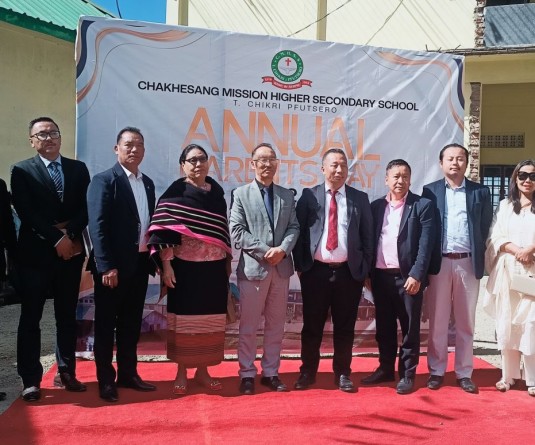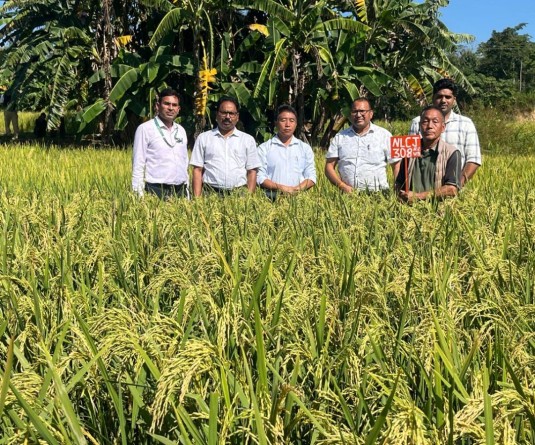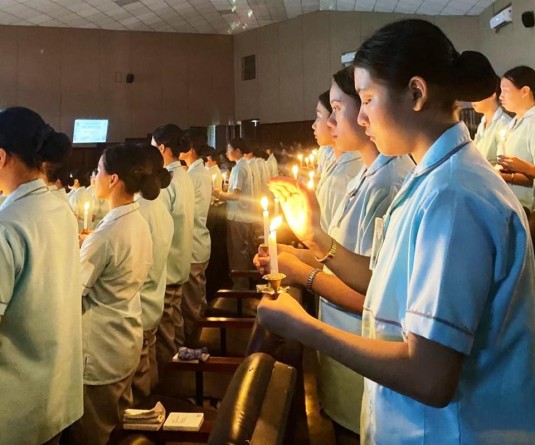
Hopes, promises and frustrations
Morung Express News
Dimapur | February 17
Promises and frustrations rear in equal measure when politicians and the public are placed on level playing fields. Promises of better days on one hand and frustration over a seemingly never changing state of affairs on the other were the two distinguishable tones that played out at "The Big Picture: Policy Matters - an open interaction with political parties" organised on February 17 in Dimapur with the Nagaland Elections 2018 as the backdrop.
The Naga Republic, Heritage Publishing House and The Morung Express jointly organised the interactive panel discussion at the Don Bosco Institute aimed to help people get a better understanding of ‘Policy Matters’ at the state level.
Elections and power struggle have come to be associated with politics. On the contrary, Along Longkumer, Editor of The Naga Republic, setting in motion the discussion remarked that public policy and public service is what lies at the core of politics. “Despite the pessimism that we see around us, I believe, we have all come here because we want to uplift the standard of our public discourse,” he said.
Representatives of 5 different political parties were in the panel: Spokesperson of the NPF, Achumbemo Kikon; General Secretary of the BJP, Nagaland unit, Jaansillung Gonmei; General Secretary of the Nagaland Pradesh Congress Committee, Capt. GK Zhimomi; Secretary (Administration) of the NPP, Samuel Sumi and the NDPP’s youth wing president, Kelhuneizo Yhome.
To begin with, the panellists were asked a set of specific queries prepared by the organisers.
The BJP’s Gonmei responding to a question concerning the popularity of Prime Minister Modi juxtaposed with apprehension surrounding the party’s alleged inclination to right-wing Hindutva forces said that the doubts are unwarranted. “BJP is really a secular party. Most of the people’s doubts are all unwarranted,” he said. According to him, the apprehensions are products of unsubstantiated claims, which are driven more by emotions than reasoning. Congressman Capt. Zhimomi asked on the NPCC projecting a rather defeatist front instead of riding an audible anti-incumbency wave admitted the party is currently down “but we are not out.” According to him, things are already reversing (for the better) for the party and evolving. He also took pot-shot as regards veteran state politicians, who were formerly Congressmen “making a beeline for new parties.”
NPF Spokesperson Kikon was asked why the people should vote for the party. Kikon, while stating that the NPF be given another opportunity to serve added that it is the only party that values the sentiments of the Naga people. According to him, the NPF is the “overground face” of the Naga people – a party that focuses on empowering women and providing the youth with a brighter future. 








 In response to a similar query, the NPP’s Samuel Sumi said that in light of the current political scenario, the party is “here to give an alternative.” Sumi said that the NPP has no “political package” but would rely on the fact that it has a clean slate as far as its presence in Nagaland was concerned and its focus on uplift of tribal communities. A new entrant but with old faces, the NDPP, according to Yhome, will bring change. He said that the party will deliver “in terms of transparency in governance.” While the questions varied in the question-answer session with the audience, the panellists also used the opportunity to highlight the visions and promises of their respective party manifestos or policies. The audience, comprising mostly students and professionals, were only too eager to fire questions, which often had the panellists taking cover or sidestepping certain queries. The frustration was palpable, the queries resonated of the general air of discontent prevalent irrespective of which party was or is in power. “How are the candidates/legislators getting richer? What are the values that make a leader?” were some of the seemingly difficult questions that flew besides others that related to governance such as roads, power, education, women empowerment, industry, government schemes and regulatory mechanisms. (To be continued...)
In response to a similar query, the NPP’s Samuel Sumi said that in light of the current political scenario, the party is “here to give an alternative.” Sumi said that the NPP has no “political package” but would rely on the fact that it has a clean slate as far as its presence in Nagaland was concerned and its focus on uplift of tribal communities. A new entrant but with old faces, the NDPP, according to Yhome, will bring change. He said that the party will deliver “in terms of transparency in governance.” While the questions varied in the question-answer session with the audience, the panellists also used the opportunity to highlight the visions and promises of their respective party manifestos or policies. The audience, comprising mostly students and professionals, were only too eager to fire questions, which often had the panellists taking cover or sidestepping certain queries. The frustration was palpable, the queries resonated of the general air of discontent prevalent irrespective of which party was or is in power. “How are the candidates/legislators getting richer? What are the values that make a leader?” were some of the seemingly difficult questions that flew besides others that related to governance such as roads, power, education, women empowerment, industry, government schemes and regulatory mechanisms. (To be continued...)





